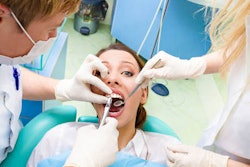
Adult patients who saw their dentist every six months for a routine checkup did not have better oral health than those who visited every two years, according to a review published on October 14 in Cochrane Library.
The best way to ensure that adult patients maintain good oral health may be to take a personalized approach based on their individual risk of dental disease. The review did not reach a conclusion about recall intervals for children or adolescents, according to the authors.
"When comparing 24-month with either 6-month or risk-based recall intervals for adults, there is moderate- to high-certainty evidence that there is little to no difference in the number of tooth surfaces with any caries, gingival bleeding and oral-health-related quality of life over a 4-year period," wrote the group, led by Dr. Patrick Fee of Dundee Dental School at the University of Dundee in the U.K.
The standard
Scheduling patients for six-month checkups and cleanings is the standard for dentists in the U.S. and most developed nations. Six-month checkups may keep some mouths healthy and prevent people from having other problems in the future, but for others it may lead to costly, unnecessary dental treatments. On the flip side, some patients who are at greater risk of developing dental disease may need to visit more often to avoid serious problems and expensive treatments.
This is the first time this review has been updated since 2013, according to the authors.
Fee and colleagues examined randomized controlled studies published through January 2020 to identify the best time interval between dental checkups. Two studies involving 1,736 people who had regular dental checkups were analyzed for the review. One study was conducted in a public dental clinic in Norway in children and adults younger than 20 years. It compared 12- and 24-month checkups and measured results after two years. The other study included adults at 51 dental practices in the U.K. That study compared six-month, 24-month, and risk-based checkups and measured results after four years. Both studies compared checkup intervals based on outcomes such as tooth decay and bleeding gums.
Numbers don't lie
With high certainty, there was little to no difference in the oral health of those who had 24-month checkups and six-month visits when the researchers analyzed patient quality of life as it related to good dental health (mean difference [MD] in Oral Health Impact Profile-14 scores, -0.24; 95% confidence interval [CI], -1.55 to 1.07; 305 participants).
With moderate certainty, there was little difference in the oral health of those who had 24-month checkups and six-month visits for tooth surfaces with caries (MD, -0.60; 95% CI, -2.54 to 1.34; 271 participants) and the percentage of sites with gingival bleeding (MD, -0.91%; 95% CI, -5.02 to 3.20; 271 participants). The review revealed low-certainty evidence for moderate to extensive caries (risk ratio, 1.05; 95% CI, 0.92-1.20; 271 participants), the authors wrote.
The review did have limitations, as the two trials did not evaluate the adverse effects of different recall strategies. Also, there was not enough reliable evidence to evaluate recall intervals for children and adolescents, they wrote.
"Whether adults see their dentist for a [checkup] every six months or at personalized intervals based on their dentist's assessment of their risk of dental disease does not affect tooth decay, gum disease, or quality of life," they concluded. "Longer intervals (up to 24 months) between [checkups] may not negatively affect these outcomes."



















